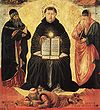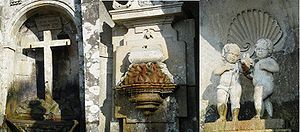- Theological virtues
-
Part of a series on St. Thomas Aquinas Scholasticism
negative theology
divine simplicity
Quinquae viae
Beatific vision
Actus purus
Sacraments
correspondence theory of truth
hylomorphism
substance theory (Ousia)
accident
substantial form
quiddity (essence / nature)
peripatetic axiom
principle of double effect
cardinal virtues
theological virtues
intellectual virtues
natural law
Just War
just price
concupiscenceInfluences and peopleAristotle ("The Philosopher")
St. Paul ("The Apostle")
Pseudo-Dionysius
St. Augustine ("The Theologian")
St. Boethius
Avicenna
Peter Lombard ("The Master")
Averroes ("The Commentator")
Maimonides ("Rabbi Moses")
St. Albertus Magnus
Reginald of Piperno Philosophy Portal
Philosophy Portal
 Catholicism Portal
Catholicism PortalTheological virtues - in theology and Christian philosophy, are the character qualities associated with salvation, resulting from the grace of God, which enlightens human mind[1].
Contents
In the Bible
The three theological virtues are:
- Faith - belief in God, and in the truth of His revelation as well as obedience to Him (cf. Rom 1:5:16:26)[2][3]
- Hope - expectation of and desire of receiving; refraining from despair and capability of not giving up
- Charity - selfless, unconditional, and voluntary loving-kindness such as helping one's neighbours.
They occur in the Bible at 1 Corinthians 13:13:
- "And now abideth faith, hope, and love, even these three: but the chiefest of these is love". (Geneva Bible, 1560).
The English word love for the third and greatest of the virtues, ἀγάπη (agapē), was used by all of the English translators of the Bible in the 16th Century, including Tyndale (1534), the Bishops' Bible (1568) and the Geneva Bible (1560). It is also used by almost all current translations of the Bible, including the New King James Version, the New American Standard Bible, and the New International Version.
The King James Version (1611) and the Challoner Douay Rheims Bible (1752) prefer the more theological term Charity for the same idea of specifically Christian love.
Catholic theology
In Catholic theology, it is held that these virtues differ from the cardinal virtues in that they can not be obtained by human effort. A person can only receive them by their being "infused"—through Divine grace—into the person.
The theological virtues are so named because the object of these virtues is the divine being (theos). Other virtues have vice at their extremes, and are only virtues when they are maintained between these extremes. In the case of the Theological Virtues, they do not contribute to vice at the positive extreme; that is, there is no vice in having an unlimited amount of faith, hope, or love, when God is the object of that virtue.
More than one vice can be the opposite of each theological virtue:
- Lack of faith may give place to incredulity (as in atheism and agnosticism), blasphemy or apostasy.
- Lack of hope may give place to despair or cynicism.
- Lack of love may give place to hatred, wrath or indifference.
Symbolism
Theological Virtues are often depicted in art as young women. The symbols most often associated with them are:
- Faith - cross, pointing upward, staff and chalice, lamp, candle
- Hope - anchor, harp, flaming brand, palm
- Love - flaming heart, with children, gathering fruit
For an example of this, the stained glass at St. Martin's Church in Brampton[4]

Books
- Paradise Restored - The Social Ethics of Francis of Assisi, A Commentary on Francis's 'Salutation of the Virtues', by Jan Hoebrichts, Franciscan Institute Publications, 2004. ISBN 9780819910080
See also
- 1 Corinthians 13
- Cardinal virtues
- Seven deadly sins (cardinal sins)
- Seven virtues, which are the four cardinal virtues and the three theological virtues
References
- ^ Cf. Second Council of Orange ch.5-7; H.J. Denzinger Enchiridion Symbolorum et Definitionum, 375-377
- ^ Pickar, C. H. (1967 (reprint 1981)). "Faith". The New Catholic Encyclopedia. 5. Washington D.C.. p. 792.
- ^ Catechism of the Catholic Church n. 2087
- ^ Visitcumbria.com
External Links
- Theological Virtues from Catholic Definitions
- The Virtues - Catechism of the Catholic Church
- Contrary, Heavenly, and Cardinal Virtues
- The Three Theological Virtues at About.com
Categories:
Wikimedia Foundation. 2010.


